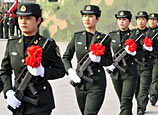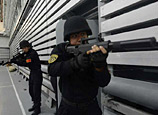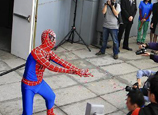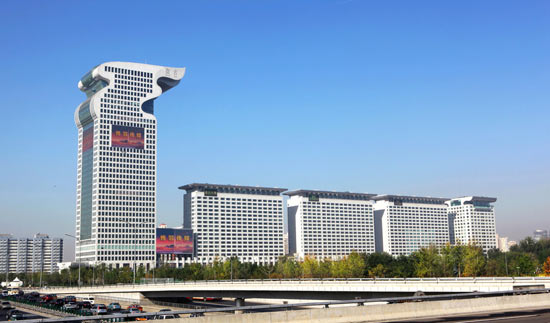
 |
| Cold food (Photo/ cqcb.com) |
Hot food and a warm hearth are always considered basic to happiness, but in ancient China people were willing to relinquish these comforts on a special day to memorialize a man who was filial to his parents and loyal to his country.
The Hanshi Festival, literally the Cold Food Festival, was traditionally celebrated on the 105th day after the Winter Solstice, but now it is often celebrated on the day before the Qingming Festival.
This year it falls today.
No fire should be lit on that day, and as a result no hot food is eaten. It's customary to eat cold food, such as cold soybean jelly, cold noodles and cold glutinous rice cakes.
Since the Hanshi Festival often falls one or two day days before the Qingming Festival in spring, it shares some Qingming customs, such as visiting ancestors' graves, going for an outing in the countryside and playing springtime games, such as tug of war and cu ju, or ancient Chinese football.
The ancient practice of fire worship is said to be the origin of a special day without fire each year. Though it provides light, warmth, cooks food and frightens away wild animals, fire is also destructive. To show respect to the fire god, each family put out the fire that was kept burning year round - for just one day. The fire was then relit for the next year.
But official story of the Hanshi Festival is that of Jie Zitui, a man who epitomized the highest Chinese values of loyalty and filial piety.
Around 2,600 years ago in the Spring and Autumn Period (770-467 BC), Prince Chong'er was exiled from the Jin Kingdom (in today's Shanxi Province) during the strife following the king's death.
Together with a few vassals, Jie followed the prince and protected him during 19 years of exile. They endured great hardship. Once the prince was near death from hunger and could not eat any wild vegetables cooked by his followers. Jie secretly cut a piece of flesh from his own leg and cooked it with wild vegetables, feeding the stew to the prince who ate all of it eagerly. When the prince learned where the food came from, he wept.
When the prince returned to the Jin Kingdom as the new king, crowned Jin Wen Gong, most of his followers from exile asked for rewards, except for Jie. He considered his loyalty to be a natural instinct and despised those who asked for wealth and rank in return for loyalty.
Jie withdrew from court, living in seclusion and simplicity with his mother in Mianshan Mountain.
When the king went to the mountain area to personally honor him with official rank, Jie refused the award and fled into the mountains with his old mother on his back.
The king was angry and knowing him to be a filial son, the king set a fire to force Jie to return. Instead, he found him burned to death with his mother in his arms, a willow tree at his back. In a hollow of the tree the king found a piece of cloth bearing a poem written in blood; it encouraged the king to remain diligent in governance and create a "clear" (qing) and "bright" (ming) era.
The king kept the blood poem as a warning and went on to become a great ruler.
In honor of Jie, the king ordered that no fire be set on the anniversary of Jie's death. Thus, everyone had to eat cold food.
In one version of the legend, the king visited Jie's tomb and saw the burned willow flourishing; he took this as a sign that Jie's spirit was transformed. He called the willow "qing ming" (clear and bright) and called the day the Qingming Festival.
Somehow, Qingming and Hanshi (Cold Food) became two separate festivals, or observations.
Enjoying a prosperous life, the residents of the Jin Kingdom were very grateful to the great man. They molded dough into the shapes of swallows and strung them together on a willow branch, hanging it on the threshold of their homes to summon Jie's spirit. This became a Hanshi ritual.
The festival used to be celebrated for a month during the Han Dynasty (202 BC-AD 220) but was canceled by Cao Cao, the king of Wei during the Three Kingdoms Period. When the Jin Dynasty (AD 265-420) swallowed the Three Kingdoms, the old traditions were revived but shortened to three days. The festival gradually spread nationwide and became an official festival in the Tang Dynasty (AD 618-907).
Though the festival is rarely celebrated in South China, the tradition is retained in Shanxi Province where it is mostly observed for one day. Traditional cold foods and snacks are served.
Important customs
Eating cold food
No fire is lit. Only cold food is eaten.
The foods, all prepared in advance, include cold congee, cold noodles, cold soybean jelly and cold glutinous rice cakes.
Hanging willow branches
The willow symbolizes respect to Jie Zitui and pursuit of a "clear and bright" era. Willow branches are placed in ancestors' tombs, hung on doorways, and small willow twigs are worn in the hair or on clothing.
Visiting ancestor's tombs
The custom coincides with that of the Qingming Festival when people sweep tombs, burn incense and leave offerings.
















 1,000-meter-long Spider Walk of Canton Tower opens
1,000-meter-long Spider Walk of Canton Tower opens


![]()
